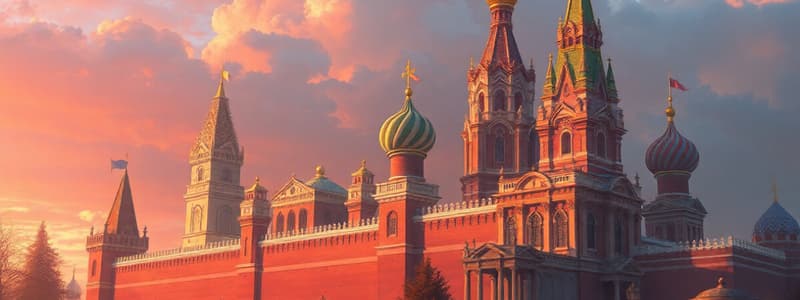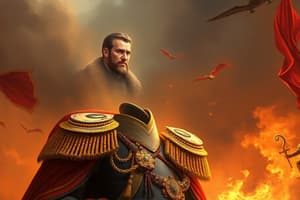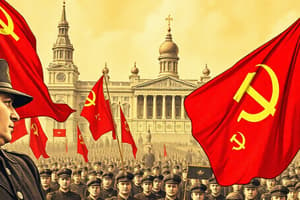Podcast
Questions and Answers
The Tsars were authoritarian royal leaders before the 1917 Russian Revolution.
The Tsars were authoritarian royal leaders before the 1917 Russian Revolution.
True (A)
The Kremlin only includes 2 palaces and 2 cathedrals.
The Kremlin only includes 2 palaces and 2 cathedrals.
False (B)
Vladimir Lenin led the Bolsheviks to create a democratic state after the Russian Revolution.
Vladimir Lenin led the Bolsheviks to create a democratic state after the Russian Revolution.
False (B)
Stalin's collectivization of agriculture led to a famine that killed between 6 and 8 million in the Soviet Union during 1932-1933.
Stalin's collectivization of agriculture led to a famine that killed between 6 and 8 million in the Soviet Union during 1932-1933.
Glasnost, implemented by Mikhail Gorbachev, promoted restriction of information.
Glasnost, implemented by Mikhail Gorbachev, promoted restriction of information.
Russia's economy is very independent of oil and natural gas prices due to its diversification.
Russia's economy is very independent of oil and natural gas prices due to its diversification.
The Volga is the shortest river in Russia.
The Volga is the shortest river in Russia.
Ukraine is among the world's largest producers of wheat, earning it the nickname 'the breadbasket of Europe'.
Ukraine is among the world's largest producers of wheat, earning it the nickname 'the breadbasket of Europe'.
The predecessor of modern Russia is Moldova.
The predecessor of modern Russia is Moldova.
Since 1994, Belarus has been under the rule of President Vladimir Putin.
Since 1994, Belarus has been under the rule of President Vladimir Putin.
Flashcards
Imperial Power
Imperial Power
Belonging or relating to an empire or the person or country that rules it.
The Tsars
The Tsars
Authoritarian royal leaders who dominated government pre-1917 Russian Revolution
Kremlin
Kremlin
A fortified complex in the center of Moscow founded by the Rurikids. Contains palaces, cathedrals and the Kremlin Wall.
Bolsheviks
Bolsheviks
Signup and view all the flashcards
Socialism
Socialism
Signup and view all the flashcards
Collectivization
Collectivization
Signup and view all the flashcards
Glasnost
Glasnost
Signup and view all the flashcards
Perestroika
Perestroika
Signup and view all the flashcards
Per Capita
Per Capita
Signup and view all the flashcards
Diaspora
Diaspora
Signup and view all the flashcards
Study Notes
- The Russian Domain notes
History
- The Mongols in the 13th century, Napoleon in 1812, and Germany in 1941 represent 3 major invasions
- 27 million Soviet civilians and soldiers lost their lives in WW2
- Russia grew from small beginnings, similar to Britain, and became an imperial power
- Tsars were authoritarian royal leaders who dominated government prior to the 1917 Russian Revolution
- Peter the Great, Catherine the Great, Alexander I, and Nicholas II were some of the most famous rulers
- There was an attempt to Russify the empire by teaching people Russian and encouraging people to convert to Russian orthodoxy
Kremlin
- The fortified complex in the center of Moscow was founded by the Russian ruling dynasty, the Rurikids
- It is best known as the Kremlin’s (Russian citadels) and includes 5 palaces, 4 cathedrals, and the enclosing Kremlin Wall with Kremlin towers
- The Rurikids ruled Kievan Rus', and ultimately the Tsardom of Russia, until 1598; they had numerous noble families claiming male-line descent from Rurik
The Russian Revolution
- The Bolsheviks, a Russian Marxist political group, led the Russian Revolution
- Vladimir Lenin led the Bolsheviks to create a socialist state, which drastically affected Eurasian economics and politics
Socialism
- Socialism is a form of government where most forms of property, including at least the major means of production and natural resources, are owned or controlled by the state
The Russian Revolution
- Joseph Stalin, who ruled from 1922-1953, was an extreme authoritarian leader who centralized state power
- Stalin's collectivization of agriculture led to a famine which killed between 6 and 8 million people between 1932-1933
Former Soviet Satellite "Republics"
- Estonia: Baltic Republic
- Latvia: Baltic Republic
- Lithuania: Russia
- Belarus: Ukraine
- Transnistria: Disputed Territories
- Moldova: Ukraine
- Crimea: Disputed Territories
- Georgia: Caucasus
- Armenia: Caucasus
- Azerbaijan: Caucasus
- Nagorno-Karabakh: Disputed Territories
- Abkhazia: Disputed Territories
- South Ossetia: Disputed Territories
- Turkmenistan: Central Asia
- Uzbekistan: Central Asia
- Tajikistan: Central Asia
- Kyrgyzstan: Central Asia
End of the Soviet System
- Soviet President Mikhail Gorbachev instituted glasnost, or openness in the 1980s
- Glasnost is a policy or practice of more open consultative government and wider dissemination of information, initiated from 1985
- Perestroika is to moving away from a planned centralized economy towards one with free markets and more private business
- Perestroika is the policy or practice of restricting or reforming the economic and political system
- During this period a failing war against Afghanistan occurred
Geopolitics
- During the 20th century, the Soviet Union's (USSR) military and political power spanned the world and was close in strength to the U.S. as a superpower
- Vladimir Putin centralized power after 2000 as president, leading to economic stability, but also a crackdown on freedoms
- Denuclearization with the U.S. was important in the latter decades of the Cold War
- Kazakhstan, Ukraine, and Belarus, former Soviet states, lost their nuclear weapons in the 1990s
- Russia has recently and in the past seen influence of the North Atlantic Treaty Organization (NATO) as a threat
Economy
- Russia's large quantity of oil and natural gas have given them a strong global economy, but an unpredictable one because these prices fluctuate often
- After the fall of the Soviet Union or post - 1991, Russia has had to rebuild and create a new economy, one that would be more free market oriented
- Most of the economic growth has come from cities and rural areas continue to struggle with poverty
- A lot of poverty is in central and Northern Siberia, similar to poor rural indigenous people in the U.S., Canada, and Australia
- Economic growth occurred in the early 2000s because of rising oil and gas prices
- Corruption and bribery are also issues
- Globalization has helped the economy, as has foreign investment in Russia, but it also hurts older less competitive firms
- Russia is considered an emerging market economy like Brazil and India
- Russia is 11th in the world GDP, and 61st in GDP/Capita
- Agriculture contributes about 5.6% to GDP, followed by industry and service, which contribute 26.6% and 67.8% respectively
Physical Geography
- Endless Siberian/cold climate spaces
- Russia has a lot of natural resources including iron ore, manganese, and chromium
- The Volga is the longest river
- Environment damaged from exploitation and overdevelopment
- Nuclear fallout from the 1986 Chernobyl nuclear power plant meltdown
- The Ural mountains are a historical culture boundary separating eastern and western Russia, also European and Asian sides of Russia
Moscow
- Built from 1555-1561
Culture and Heritage
- The origin of Russia lies in the Slavic people, a northern branch of the Indo-European language family
- Slavic languages include Russian, Ukrainian, and Belarusian
- Non-Slavic languages include Romanian and Armenian
- Slavic neighbors include Poles, Czechs, Slovaks, Slovenians, and Croatians
- Religion is primarily Eastern Orthodox Christianity
- There is a history of popular composers (Igor Stravinsky), novelists (Fyodor Dostoyevsky and Leo Tolstoy), and playwrights (Anton Checkhov)
- A Russian saying, “Only fools smile without any reason.”
Russian War Memorial
- In an open village of Dubosekovo (60 miles from Moscow) one can find a monumental complex devoted to the so-called 28 Panfilov heroes. Six 32 feet-high sculptures glorify the deeds of troops from the 316th Rifle Division who served under the command of Major General Ivan Panfilov
- On the 16th November 1941, during the German offensive on Moscow, 28 soldiers from this unit took out 18 enemy tanks in 4 hours of intense fighting
- A famous phrase “Russia is a vast land, yet there is nowhere to retreat - Moscow is behind us!” was spoken by one of the Panfilov soldiers
Ukraine
- Since 2022, Ukraine has been fighting a full-scale war against Russia, following Russia's invasion and the conflict has major global political and economic consequences
- Ukraine is one of the world's largest producers of wheat, corn, and sunflower oil, earning the nickname “the breadbasket of Europe."
- Ukraine has a distinct national identity, with a rich history dating back to Kyivan Rus, considered a cultural and political predecessor of modern Ukraine, Belarus, and Russia
Belarus
- Alexander Lukahenko has ruled Belarus since 1994, making it one of the most authoritarian states in Europe
- Belarus is a close ally of Russia, allowing Russian military operations within its borders, especially during the 2022 invasion of Ukraine
- Belarus has harsh crackdowns on political opposition, protests, and independent media, leading to international sanctions
Moldova
- A breakaway region called Transnistria, backed by Russia, has declared independence from Moldova, creating ongoing tensions
- Moldova is seeking European Union (EU) membership and has been granted EU candidate status
- Moldova is one of Europe's poorest countries, facing economic struggles due to its reliance on agriculture and energy dependence on Russia
Georgia
- Russia occupies about 20% of Georgia's internationally recognized territory (Abkhazia and South Ossetia) after conflicts in the 1990s and the 2008 Russia-Georgia war
- Georgia is pursuing closer ties with the European Union and NATO, though full membership remains uncertain due to Russian opposition
- Georgia has a unique geographic position, featuring the Caucasus Mountains and the Black Sea, which shape its climate and economy
Armenia
- Armenia has long standing tensions with Azerbaijan over Nagorno-Karabakh, a region with a historically Armenian population that Azerbaijan regained control of in 2023
- Armenia was the first country to officially adopt Christianity as a state religion in 301 AD
- The Armenian Apolistic Church remains central as its identity
- Armenia has a large global diaspora in the U.S., France, and Russia, which plays a major role in its economy and politics through remittances and lobbying efforts
Studying That Suits You
Use AI to generate personalized quizzes and flashcards to suit your learning preferences.




